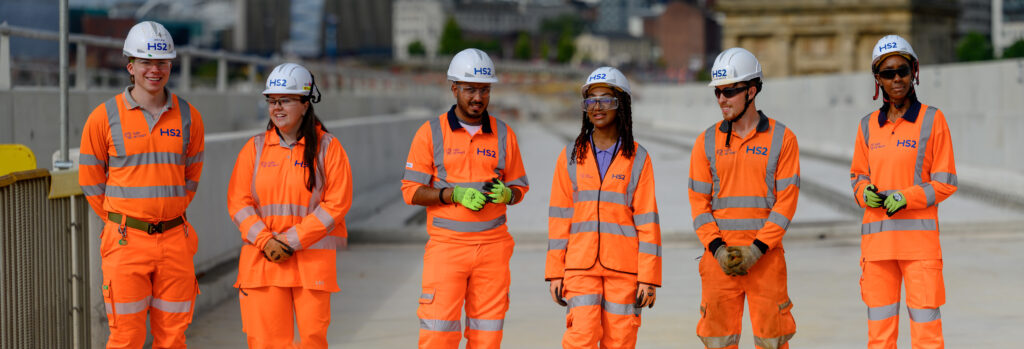
The number of unemployed people transitioning into jobs on HS2 is continuing to grow. Figures released today (28, August 2025), show that in the last three months, a further 168 people who were out of work are now helping to build Britain’s new railway.
In total, 5,191 jobseekers have benefitted from specialist training and support to help them to progress into new careers on the project.
The continued success in engaging and upskilling people ready for work is attributed to HS2’s job brokerage model. Partnerships with the Department for Work and Pensions, the National Careers Service, local authorities, and employment support services along the line of route identify a continual stream of unemployed candidates to put forward for vacancies.
Secondly, by working closely with the supply chain, further education colleges and specialist training providers, HS2 has spearheaded the creation of multiple training centres and skills academies – stretching from central London through to Buckinghamshire, Northamptonshire and the West Midlands.
Training programmes address nationwide skills shortages and, importantly, the job roles that HS2’s four construction partners need to deliver their respective sections of the 140-mile-long railway. This timely and targeted approach, driven by workforce planning, ensures that HS2’s frontline workforce, and its support teams, have strong local connections, with the right skills, in the right numbers.
The Construction Industry Training Board (CITB) forecasts that an extra 240,000 construction workers will be needed over the next five years to support the government’s future growth and housebuilding targets. HS2’s investment in upskilling workers, with transferable skills, will not only benefit HS2’s delivery, but other major construction projects of the future.
Rebecca Young, HS2 Ltd’s Head of Skills and Inclusion said:
“HS2’s skills and employment team has built and implemented a world-class pre-employment training model that is helping people to turn their lives around and build promising careers. Our investment in upskilling is delivering long-term benefits to individuals and the economy. It’s a legacy benefit we’re exceptionally proud of.”
In the West Midlands, London and the Chilterns, thousands of candidates have progressed through fast-track pre-employment training programmes. In just six to eight weeks, the tailored courses give learners the skills and accreditation they need to begin work in both office and site-based roles supporting HS2’s construction.
Successful completers are job-matched to vacant roles or offered paid work trials to allow them more time to adjust to their new workplace environment and determine their preferred career specialism.
Onward progression and continued investment in upskilling has led to candidates pursuing a broad range of careers from tunnelling to formwork and civil engineering to surveying. A high proportion of new entrants advance into apprenticeships, where they combine work and study to secure recognised qualifications that align to their chosen career.
The latest figures show that 1,922 people have now started an apprenticeship on HS2, with programmes offered at intermediate through to degree-level. In the last quarter, there were 57 new apprentice starts, putting HS2 Ltd a step closer to its target of creating 2,000 apprenticeships.
Jan Dwyer from Birmingham spent 17 years as a trainer and co-ordinator for a large cinema chain, but was made redundant when the business went into administration. After visiting her local Jobcentre, Jan secured a job with Balfour Beatty VINCI (BBV), HS2’s construction partner in the Midlands. She is now enjoying her new role as a receptionist at BBV’s Kingbsury site offices.
Jan, from Birmingham, said:
“I’d recommend BBV to anyone who wants to develop and learn new skills. Working on an iconic project like HS2 is a great opportunity to kickstart your career, no matter what stage in life you’re at.”
HS2 Ltd’s CEO, Mark Wild, is currently resetting the project to make sure it can be delivered to the lowest reasonable cost, and work is underway to prepare new, reliable cost and schedule ranges which will be presented to government later this year.
When complete, HS2 will improve connections between London and the West Midlands, with trains running further north on existing lines. This new high-speed railway will create quicker and far more reliable journeys, driving economic growth while crucially freeing up space for more local trains on the most congested part of the existing West Coast Main Line.
For more information about careers and employment opportunities with HS2 and its supply chain partners, visit hs2.org.uk/careers
